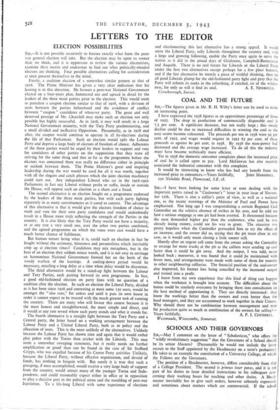SIR, —I have been looking for some letter or note dealing
with the important points raised in " Coalowner's " letter in your issue of Novem- ber 12th. There is also a collier's point of view, as well as a national one, as the recent warnings of the Minister of Fuel and Power have emphasised. Not long ago I was congratulating a certain Regional Coal Controller on the relative, absence of strikes in his area, and he told me how a serious stoppage at one pit had been averted. It threatened because the men demanded higher pay than the coalowner, who said he was already losing money, could see his way to grant. The situation was pretty hopeless when the Controller persuaded him to try the effect of an increase, and the owner did so, saying that the pit must close in any case, so it would only mean closing a little sooner still.
Shortly after an urgent call came from the owner asking the Controller to arrange for more trucks at the pit as the colliers were sending up coal faster than it could be jot away. And the output, I was told, never looked back ; moreover, it was found that it could be maintained with fewer men, and arrangements were made with some of them for transfer to other neighbouring collieries. The financial position of the coal-owner also improved, his former loss being cancelled by the increased output and turned into a profit.
I know from my own experience that this kind of thing can happen when the workman is brought into account. The difficulties about the bonus could be similarly overcome by bringing them into consultation on the best method of apportioning it. They are directly interested: they know the workings better than the owners and even better than the head managers, and they are accustomed to work together in their Unions. Why should there not be combination between management and men for production quite as much as combination of the owners for selling?—


























 Previous page
Previous page